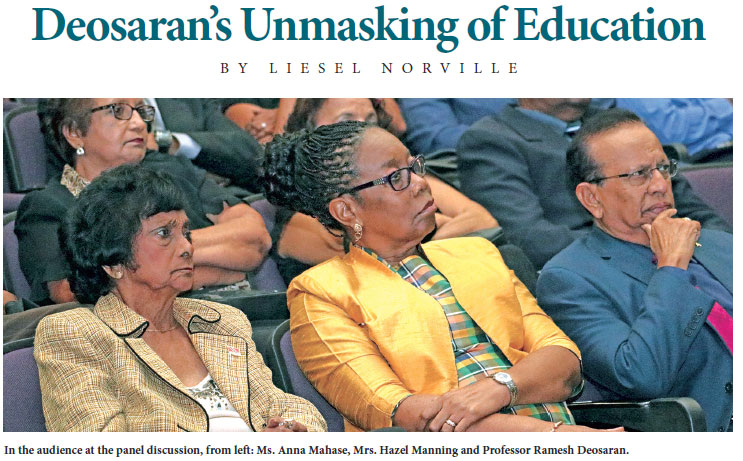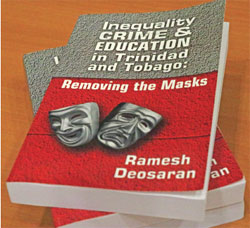|
July 2016

Issue Home >>
|


 Professor Ramesh Deosaran’s latest book focuses on the inequality and inequity of Trinidad and Tobago’s education system and its correlation to crime. Looking at the country’s past, present and future, he examines how ethnicity, social class, gender, family background, place of residence and type of school attended affects the equality of educational opportunities. The book traces the background of the country’s education system, investigating the changes arising out of political independence in 1962 and the prospects of education as the great hope for decolonisation, where meritocracy would lead the nation into industrialisation. Professor Ramesh Deosaran’s latest book focuses on the inequality and inequity of Trinidad and Tobago’s education system and its correlation to crime. Looking at the country’s past, present and future, he examines how ethnicity, social class, gender, family background, place of residence and type of school attended affects the equality of educational opportunities. The book traces the background of the country’s education system, investigating the changes arising out of political independence in 1962 and the prospects of education as the great hope for decolonisation, where meritocracy would lead the nation into industrialisation.
Deosaran unmasks the reality faced by the present education system and how inequality and inequity plagues the dual system of education in Trinidad and Tobago: denominational vs government school. Assigning prestige to one school over another, he wrote, causes a large number of students to feel less significant and under-educated. He believes technical-vocational schools need to be brought to the same level as grammar schools as they provide mainstream learning for students and are very important to the development of the country.
Deosaran closes off by identifying the impact of the pressures and strain of inequality experienced in the education system, which he says causes students to be involved in criminal activities. However, not all uneducated persons commit crime, as there are other factors that contribute to criminal behaviours. Interestingly absent are the issues surrounding persons who commit corporate crime.
From his immense research Deosaran’s recommendations for changes in Trinidad and Tobago are concentrated on policy changes and reformation of the current system of education. The topics covered reach far beyond the struggles of the education system, including issues of race, social class and place of residence, which have arisen in the areas of employment and general socialisation.
All in all, it is an important work in the area of education and contributes significantly to the understanding of its correlation with crime.
On June 1, a panel discussion was held at The UWI to look at how this work could go forward. Mediated by retired educator, Dr. Lennox Bernard, the discussion covered a number of issues. Former Senator, Dr. Eastlyn McKenzie, an educator herself, pointed out that the book reads as a book on Trinidad, exclusive of Tobago, as she identified differences of the Tobago experiences in relation to its history, population diversity and lack of denominational schools. Mr. David Sinanan, President of TTUTA, noted that people are being denied a chance to make a meaningful contribution in society because they are being force-fed the illusions of equality. Senior Lecturer in Behavioural Sciences at The UWI, Dr. Nasser Mustapha’s main focus was that government schools are well maintained and managed, but are under-appreciated by society as places of good quality schooling. How does a culture get away from itself? This was the difficult question posed by Dr. Gillian Paul, President of COSTATT. Dr. Winford James agreed that the book may not apply to the Tobago experience. He added that the book gave the impression that if you are ignorant you will commit crime. But he also felt it provides vital information on the distinction between denominational and government schools, noting that there are government schools that are performing very well but do not receive the recognition they deserve.
The panelists agreed that there is a need for policy changes and reform in the education system to be less exclusive of certain denominations and sectors of the society. As the audience became very responsive to the discussion, the main conclusion was that the school is not the sole educator and families must be engaged for real change to occur.
Liesel Norville is a student in the MSc Criminology and Criminal Justice programme at The UWI St. Augustine. |





